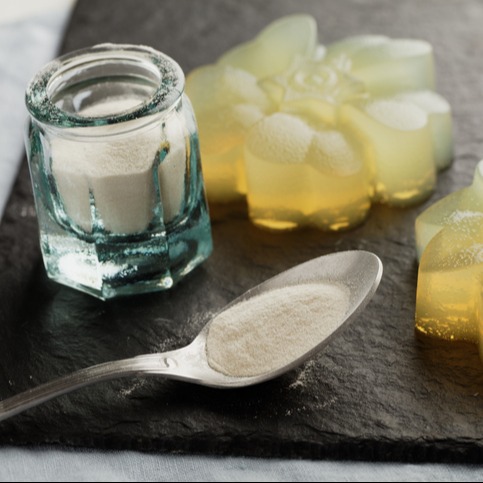
Gelatin and collagen are often confused due to their shared origins, but they have distinct characteristics and applications. While collagen is essential for maintaining skin, joint, and bone health, gelatin is primarily valued for its culinary versatility. Understanding their differences in structure, digestion, and use can help you make more informed choices about your diet and wellness.
Key Takeaways
Collagen is a structural protein in the body; gelatin is a denatured form of collagen produced through partial hydrolysis.
Gelatin dissolves in hot liquids and forms gels; collagen peptides dissolve in both hot and cold beverages.
Both support skin, joint, and gut health, but gelatin is particularly effective for gut lining repair.
Collagen supplements are often easier to digest and typically provide more consistent dosage information.
Allergies and digestive discomfort can occur with overconsumption—choose based on your specific health needs.
Understanding the Differences Between Gelatin and Collagen
Grasping the differences between gelatin and collagen is key for both nutrition and culinary use. Collagen is the most abundant protein in the human body, comprising 25–35% of total protein mass. Gelatin is derived from collagen through partial hydrolysis, resulting in shorter amino acid chains that make it easier to digest, though somewhat less bioavailable than hydrolyzed collagen peptides.
Structurally, gelatin dissolves only in hot liquids and solidifies when cooled, making it ideal for culinary applications like jellies and broths. Collagen peptides, on the other hand, dissolve in both hot and cold liquids, allowing them to be seamlessly added to drinks and smoothies.
Both contain amino acids such as glycine and proline, which support connective tissue, but they serve different purposes depending on your goals—be it dietary supplementation or culinary enhancement.
Health Benefits of Gelatin and Collagen
Both gelatin and collagen provide a wide array of health benefits. Here’s how they compare:
Health Benefit | Gelatin | Collagen |
Skin Health | Improves elasticity | Reduces wrinkles and dryness |
Joint Pain Relief | Alleviates discomfort | Enhances joint mobility |
Gut Health | Supports gut lining repair | May reduce gut inflammation |
Research shows that collagen supplementation can improve skin hydration and elasticity, while gelatin is often favored for its ability to support gut health by reinforcing the intestinal lining. Both also help alleviate joint discomfort—especially in individuals with arthritis—and can contribute to improved satiety and weight management.
Ways to Incorporate Gelatin and Collagen Into Your Diet
Adding gelatin and collagen to your diet can be simple and enjoyable. Collagen peptides dissolve easily in both hot and cold liquids, making them a convenient addition to smoothies, coffee, or tea for a daily protein boost. Gelatin powder, on the other hand, is ideal for creating homemade fruit gummies, marshmallows, or jellies. It also serves as a natural thickening agent for soups and sauces, enhancing both texture and nutritional value. For a quick and portable snack, no-bake energy bites made with oats, honey, and collagen offer a satisfying protein-rich option. Additionally, bone broth—naturally rich in gelatin—can be used as a nourishing base for soups, stews, or enjoyed on its own as a warm, restorative beverage.
Risks and Side Effects of Gelatin and Collagen
While gelatin and collagen are generally safe for healthy adults, some individuals may experience side effects associated with their consumption. People with allergies to specific sources—such as fish, shellfish, poultry, or beef—should exercise caution, as these allergens can be present in certain gelatin and collagen products. Additionally, some supplements may have an unpleasant taste, although mixing them with beverages can help mask it. Excessive intake of gelatin or collagen may lead to digestive discomfort or bloating, particularly in sensitive individuals. Despite these concerns, clinical evidence indicates that both gelatin and collagen are well-tolerated when consumed within recommended dosages, and adverse effects remain rare for most users. For individuals with dietary restrictions, careful label-checking is strongly advised.
Choosing the Right Product for Your Needs
Understanding the differences between gelatin and collagen can help consumers make informed choices tailored to their specific needs. For those focused on gut health, gelatin may be preferable, as it helps coat and support the intestinal lining, while collagen primarily aids in maintaining healthy skin and joints. Collagen peptides, being easier to digest, can be conveniently added to drinks, making them ideal for daily supplementation. Conversely, gelatin excels in cooking and baking due to its gelling properties, which are essential for recipes such as jellies and desserts. Collagen supplements typically offer clearer dosage information, assisting in more accurate tracking of protein intake than gelatin. Ultimately, the best choice depends on individual dietary goals and the desired health benefits, whether for culinary applications or nutritional support.
Conclusion
In the ultimate showdown between gelatin and collagen, there’s no true winner—only different strengths. Gelatin is the culinary powerhouse, ideal for transforming dishes with its thickening magic. Collagen is the wellness champion, promoting healthier skin, joints, and digestion.
Whether you’re looking to improve your health or elevate your cooking, both can play a valuable role. Use them wisely and enjoy the combined benefits they offer for a healthier, tastier lifestyle.
Frequently Asked Questions
Is It Better to Take Collagen or Gelatin?
Collagen is typically more versatile and easier to absorb, making it ideal for daily supplementation. Gelatin is best used in cooking and offers excellent gut-healing properties. The better choice depends on your individual goals.
Is It Safe to Eat Gelatin Every Day?
Yes, daily consumption of gelatin is generally safe for healthy individuals. It offers beneficial amino acids, especially for joint and digestive health. Just be mindful of portion sizes to avoid digestive discomfort.
Does Gelatin Promote Hair Growth?
Gelatin contains amino acids that support hair health, but strong scientific evidence linking it directly to hair growth is limited. It may help indirectly by supporting collagen production and overall nutrient intake.
Does Jell-O Really Have Collagen?
Jell-O is made from gelatin, which is derived from collagen. However, it’s processed and often contains sugars and additives, so it doesn't offer the same health benefits as high-quality collagen supplements.
Rely on PlanetDrugsDirect.com to Buy Online Prescription Drugs
As a trusted prescription referral service, we offer important benefits whenever you order online. Each of our partner pharmacies and/or government-approved dispensaries is committed to providing the best experience possible of any online prescription referral service on the internet. We offer:
Low prices
Quick turn-around times
Generic and brand-name medications
Unparalleled customer service
Sources
Ahmad MI, Li Y, Pan J, et al. Collagen and gelatin: Structure, properties, and applications in food industry. Int J Biol Macromol. 2024 Jan;254(Pt 3):128037. doi: 10.1016/j.ijbiomac.2023.128037. Epub 2023 Nov 12. PMID: 37963506.
Liu D, Nikoo M, Boran G, Zhou P, Regenstein JM. Collagen and gelatin. Annu Rev Food Sci Technol. 2015;6:527-57. doi: 10.1146/annurev-food-031414-111800. Epub 2015 Mar 23. PMID: 25884286.
Naomi R, Bahari H, Ridzuan PM, Othman F. Natural-Based Biomaterial for Skin Wound Healing (Gelatin vs. Collagen): Expert Review. Polymers (Basel). 2021 Jul 14;13(14):2319. doi: 10.3390/polym13142319. PMID: 34301076; PMCID: PMC8309321.
Shaw G, Lee-Barthel A, Ross ML, Wang B, Baar K. Vitamin C-enriched gelatin supplementation before intermittent activity augments collagen synthesis. Am J Clin Nutr. 2017 Jan;105(1):136-143. doi: 10.3945/ajcn.116.138594. Epub 2016 Nov 16. PMID: 27852613; PMCID: PMC5183725.
 Medically reviewed by
Medically reviewed by 





